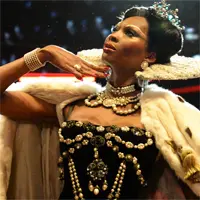On FX's Pose, dancing is about self-expression and it's a survival skill for trans women
-

"Perfecting the moves and the sassitude is crucial in this show," says dance critic Sarah L. Kaufman of Pose. "More important," she adds, "indulging in the exaggerated femininity of the spins, dips and floor poses of voguing, and practicing a killer runway walk in six-inch heels, were keys to survival. As the crowd jeers and cheers, competitors vie for trophies in different categories, each one with specific requirements in costuming and mannerisms, such as 'executive,' 'town and country' and 'royalty.' Confidence and stately self-presentation might bring a trans woman or gay man closer to the golden ideal of fitting into cisgendered society." As Dominique Jackson, who plays Pose’s haughty quasi-villain Elektra Abundance, explains: “That’s why we have categories like 'realness.' In the realness categories, what happens is you walk and your peers judge you, because if you’re not able to walk amongst your peers and pass as being cis male or cis female, then it’s obvious that you haven’t done enough work. They wanted you to be able to go outside and come back home safely.”
ALSO:
- Pose upgrades its "realness" in Season 2 without sacrificing its glimmer and grit: "Some shows take a while to find their way, but the same can be said of viewers," says Hank Stuever. "That old Twilight Zone line, about not adjusting one’s TV set if what you’re seeing is unfamiliar, can just as well apply to the viewer’s mind-set, which often needs adjusting or even a slap on the top to properly receive the signal. Sometimes, to get what a good TV drama is telling you, you have to stop wishing it was something else. That’s one way of saying that I’m glad FX’s Pose returns Tuesday night with a resolute confidence in both its big glimmer and its basic grit. It hasn’t gone out and gotten a major makeover for Season 2, but it has applied some necessary tweaks."
- Billy Porter deserves an Emmy for Pose: "While it’s hard not to notice how often he is relegated to announcing the next category and reading the judges’ scores," says Inkoo Kang, "it’s equally hard not to notice how Porter manages to make every ball an event, how much energy he injects into every scene he’s in, and how crucial he is to Pose’s most tragic and most celebratory moments. He may not be the star of this ball, but in episode after episode, he’s the cast member most capable of making the show’s arch dialogue sound not just naturalistic but inevitable. It’s a performance that deserves its own kind of trophy: an Emmy."
- Pose never loses sight of the very real, disproportionately high level of danger for trans women, especially black trans women
- Why Madonna's "Vogue" is woven into Pose's Season 2 narrative: "If we're looking at the history of ballroom and specifically that moment in time, what Madonna did was bring ballroom to the mainstream," says co-creator Steven Canals. "She introduced the world to this community who, up until that point in time, had been a subculture."
- Billy Porter decries the "double layer" of casting discrimination he experiences: "The layer of being a person of color in this industry, and the other layer of being a queen. No one can see you as anything else."
- How casting director Alexa Fogel found trans actors from diverse communities: "I’ve cast many things that were far outside my very obvious world, and I think whenever you do that, you have to do a little bit more research," she says. "You have to find whatever that community is and find your ambassadors. In the case of Pose, we did that: We reached out to communities; we found ambassadors in the ball scene. The truth is, it just takes a little extra time, but it wasn’t harder. It’s not so different from what I did on Generation Kill when it came to Recon Marines. You just have to be smart about it and be patient and listen to what people are telling you."
- Ryan Murphy says Pose is bigger in Season 2: "And the themes seem bigger"
- Janet Mock writes about learning on the job as a Pose director
- Watch Mock explain the use of preferred gender pronouns
- Pose is already changing red carpet habits: Its Emmy For Your Consideration event came with a tip sheet for preferred gender pronouns
TOPICS: Pose, FX, Alexa L. Fogel, Billy Porter, Dominique Jackson, Janet Mock, Madonna, Ryan Murphy, Steven Canals, Casting Directors, LGBTQ
